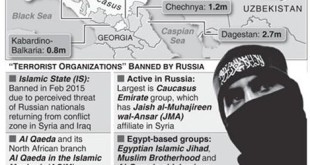The West, Turkey, and Saudi Arabia all have their own angles in the conflict—but Salafism and anarchy may be the big winners.
"The American Conservative" — The tale of what is going on in Syria reads something like this: an insurgency active since March 2011 has been funded and armed by Saudi Arabia and Qatar and allowed to operate out of Turkey with the sometimes active, but more often passive, connivance of a number of Western powers, including Britain, France, Germany, and the United States. The intention was to overthrow the admittedly dictatorial Bashar al-Assad quickly and replace him with a more representative government composed largely of Syrians-in-exile drawn from the expat communities in Europe and the United States. The largely ad hoc political organization that was the counterpart to the Free Syrian Army ultimately evolved into the National Coalition for Syrian Revolutionary and Opposition Forces (Syrian National Coalition) in November 2012, somewhat reminiscent of Ahmad Chalabi and the ill-starred Iraqi National Congress. As in the lead-up to regime change in Iraq, the exiles successfully exploited anti-Syrian sentiment among leading politicians in Washington and Europe while skillfully manipulating the media narrative to suggest that the al-Assad regime was engaging in widespread atrocities and threatening to destabilize its neighbors, most notably Lebanon. As in the case of Iraq, Syria’s possession of weapons of mass destruction was introduced into the indictment of al-Assad and cited as a regional threat.
If there was a model for what was planned for Syria it must have been the invasion of Iraq in 2003 or possibly the United Nations-endorsed armed intervention in Libya in 2010, both of which intended to replace dictatorial regimes with Western-style governments that would at least provide a simulacrum of accountable popular rule. But the planners must have anticipated a better outcome. Both Libya and Iraq have become more destabilized than they were under their autocrats, a fact that appears to have escaped everyone’s notice. It did not take long for the wheels to fall off the bus in Syria as well. As in Iraq, the Syrian exiles had no real constituency within their homeland, which meant that the already somewhat organized resistance to al-Assad, consisting of the well-established Muslim Brotherhood and associated groups, came to the fore. Al-Assad, who somewhat credibly has described the rebels as terrorists supported by foreign governments, did not throw in the towel and leave. The Turkish people, meanwhile, began to turn sour on a war which seemed endless, was creating a huge refugee and security problem as Kurdish terrorists mixed in with the refugees, and was increasingly taking on the shape of a new jihad as foreign volunteers began to assume responsibility for most of the fighting.
The proposed alternative government of the Syrian National Coalition was quickly recognized by Washington and the Europeans, primarily because it promised some kind of democratic and pluralistic future for Syria and control over the disparate and sometimes radical elements in the Free Syrian Army. The supporters of the rebellion in the West were willing to hold their collective noses and endorse the enterprise even though it was dominated by the Muslim Brotherhood and other Islamists rather than by Western-educated liberals and other secularists. But the painstakingly arrived at distribution of power provided no real solution as the Coalition had no authority over most of the actual rebel combatants and little ability to enforce standards on the cadres who were fighting the Syrian Army in Aleppo and Damascus. Emphasizing its political divisions and also its essential powerlessness, on January 21, 2013 the Coalition was unable to agree on who might be part of a transitional government to run the areas controlled by the insurgents, largely because the Muslim Brotherhood was unwilling to cede authority to other groups. Since that time it has failed to agree on possible conditions for initiating peace negotiations with the al-Assad government.
There will be plenty of finger-pointing in Washington and in the European chanceries over what went wrong, but one issue that will probably not be confronted directly is the competing objectives of the various supporters of the insurgents, which should have been visible right from the beginning. The U.S. and the Europeans clearly envisioned some kind of humanitarian intervention which would lead to a new, more representative government, but that was not the goal of Turkey, which sought a pliable replacement regime that would clamp down on the activities of groups like the separatist Kurdish Workers Party (PKK), Ankara’s primary geopolitical security concern.
Perhaps even more important, people in Washington should have also been asking why Saudi Arabia and Qatar wanted to overthrow al-Assad and what kind of government they had in mind to replace him. Saudi Arabia’s rival as regional hegemon, Iran, is viewed in Riyadh as ascendant due to the rise to power of a friendly Shia regime in Iraq as a result of the American invasion and regime change. This has permitted the development of a geographically contiguous Arab bloc closely tied to Tehran and its regional interests, running through Iraq, across Syria, and connecting with Hezbollah in Lebanon and Hamas in Gaza. To break up that de facto coalition, the Saudis, who see Syria as the weak link in the chain, have sought to replace Assad’s Alawite-led government with a Sunni regime. But there is also a second agenda. Because the ruling minority Alawites are considered to be heretics similar to Shi’ites, a change in religious orientation would be necessary, with the Saudis serving as protectors of the Sunni majority. The Riyadh-backed Sunni regime would of course be expected to conform with the particularly Saudi view of proper religious deportment—the extremely conservative Wahhabism that prevails in the Kingdom, which is closer to the views of the more radical insurgents while hostile to the secularists. It would also make the country’s significant numbers of Christians, Alawites, Shi’ites, and Kurds potential victims of the arrangement.
All of which means that the Saudis and their allies Qatar believe in change in Syria, but on their own terms, and they actually oppose enabling a populist or democratic evolution. In fact, Riyadh has been actively engaged regionally in doing what it can to contain the unrest resulting from the Arab Spring so that the populism does not become untidy and spill over into Saudi Arabia itself. This has meant that from the beginning Saudi and Qatari objectives in Syria have differed from the goals of either Turkey or the Western powers, which should have been seen as a recipe for disaster.
And it gets even more complicated. In spite of their tendency to support religious groups rather than secular ones, Saudi Arabia and its ally Qatar view the Muslim Brotherhood’s “political Islam” as one of the divisive elements that has destabilized countries like Egypt, unleashing forces that could ultimately threaten the Saudis and Qataris themselves. As a result, working through their surrogates in Lebanon and in Turkey as well as in Jordan, they have systematically and deliberately starved most of the Free Syrian Army of money and weapons, instead diverting their assistance to the militant Jabhat al-Nusra, a Salafist group alleged to have links to al-Qaeda. Al-Nusra is generally regarded as the most effective insurgent group when it comes to fighting, but it advocates a strict Sunni religious state as part of a worldwide Caliphate under Sharia law when the fighting is concluded. It has also become a magnet for the foreign jihadis who have been drawn into the rebellion, an issue that has raised concerns in Washington because of the likelihood that any successor regime to al-Assad could easily be dominated by a well-armed and disciplined Salafist minority.
Ironically, the Saudis are acutely aware that aid to groups like al-Nusra could easily blowback and feed a new wave of jihadi-led violence—with al-Nusra playing a similar role to that of al-Qaeda after it cut its teeth in Afghanistan—but they are unfortunately locked into their own rhetoric regarding what is necessary to take down al-Assad and break the coalition of Arab states aligned with Iran. What it means for the other players in the tragedy is that Syria is de facto in a bloody civil war that is approaching stalemate, while the United States and Europeans have no good options and the Turks are increasingly playing damage control. If there is a solution to the conflict it is not readily discernible, and it is now doubtful whether some kind of resolution by force could be imposed even if Washington and the Europeans were inclined to do so, which they are not.
Syria is in danger of ceasing to exist as a nation-state. Its collapse could inspire a new global jihad and provoke violence throughout the Middle East, while its chemical weapons could easily fall into dangerous hands. Well-armed bands of the most radical of the insurgents taking the lead in the conflict without any political direction or control cannot be what anyone envisioned two years ago, but that is what has emerged, with the United States again looking on like a helpless giant.
Philip Giraldi, a former CIA officer, is executive director of the Council for the National Interest.
Post Disclaimer | Support Us
Support Us
The sailanmuslim.com web site entirely supported by individual donors and well wishers. If you regularly visit this site and wish to show your appreciation, or if you wish to see further development of sailanmuslim.com, please donate us
IMPORTANT : All content hosted on sailanmuslim.com is solely for non-commercial purposes and with the permission of original copyright holders. Any other use of the hosted content, such as for financial gain, requires express approval from the copyright owners.
 Sri lanka Muslims Web Portal Sri Lanka Muslims News Center
Sri lanka Muslims Web Portal Sri Lanka Muslims News Center




